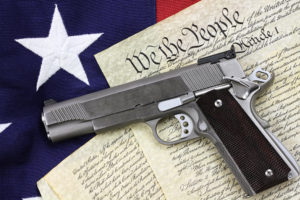 [Updated June 15, 2020: The Supreme Court denied cert in all 10 cases. So, gun laws remain in limbo for at least another term.]
[Updated June 15, 2020: The Supreme Court denied cert in all 10 cases. So, gun laws remain in limbo for at least another term.]
Recently, the Supreme Court declined to rule in a Second Amendment case, New York State Rifle & Pistol Association Inc. v. City of New York, which could have allowed it to clarify just how far the landmark Second Amendment cases Heller and McDonald go. But New York City changed the controversial law as soon as it realized the case was headed to the Supreme Court; since the law was no longer in effect, a majority of Justices said there was no case to rule on. But it looks like some Massachusetts cases just may provide the opportunity NYC didn’t.
In District of Columbia v. Heller, (2008), the Court struck down the District of Columbia’s handgun ban and its requirement that lawfully owned rifles and shotguns be kept “unloaded and disassembled or bound by a trigger lock.” The Court declared that an individual’s right to keep and bear arms for lawful purposes is independent of service in a militia, and that such lawful purposes included self-defense within the home. Washington D.C. is a federal enclave, so people were unsure whether this ruling applied to the states under the “incorporation” theory of the Fourteenth Amendment. In McDonald v. City of Chicago (2010), the Court affirmed that it did.
So what’s going on in Massachusetts – my birthplace, and also the birthplace of the American Revolution? The place where its citizens once stood up to government oppression and where the confiscation of guns and gunpowder by the British was one factor that sparked a war? Under its current laws, individuals who want to carry a concealed firearm have to prove to government authorities that they have “good reason” to fear for their safety before a permit is issued. Not to go too in depth into constitutional law, but laws that restrict our individual rights can’t be arbitrary. In other words, they must be quantifiable, measurable, and apply equally to everyone. The argument here is that “good reason” is very subjective and therefore unconstitutional. And, of course, the other argument is that self-defense is a natural right and no reason is needed when it comes to self-protection.
Massachusetts has also enacted so-called “assault weapons” and ammunition bans. Its definition of “assault weapons” is so broad that it includes many popular guns. I’ve seen estimates that about half of the types of guns legal under federal law are banned in MA. The constitutional issue here is some wording in Heller that implies that individuals have a right to own guns “in common use.” But appeals courts are reading Heller and McDonald oddly – everyone’s all over the map and no one seems to really know how to apply either case.
The MA ban also includes “copies or duplicates” of so-called assault weapons. What does that mean? No one knows for sure. Another tenet of constitutional law is that a law can’t be vague, so that’s also on the table.
There’s no guarantee the Court will agree to hear these MA cases, but it’ll sure be interesting if it does.
Other articles you may find interesting:
What is a Title II or NFA firearm?
Medical Marijuana & Guns: Legal Advice from a Doctor?








